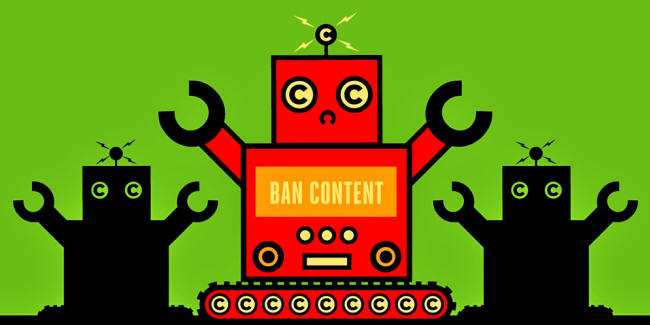|

by Cory Doctorow
September 5,
2018
from
EFF Website
Spanish
version

In exactly one week, the European Parliament will hold a crucial
debate and vote on a proposal
so terrible, it can only be called
an extinction-level event for
the Internet as we know it.
At issue is the text of the new EU Copyright Directive, which
updates the 17-year-old copyright regulations for the 28
member-states of the EU.
It makes a vast array of
technical changes to EU copyright law, each of which has
stakeholders rooting for it, guaranteeing that whatever the final
text says will become the law of the land across the EU.
The Directive was pretty uncontroversial, right up to the day last
May when the EU started enforcing the General Data Protection
Regulation (GDPR), a seismic event that eclipsed all other
Internet news for weeks afterward.
On that very day, a
German MEP called Axl Voss quietly changed the text of the
Directive to
reintroduce two long-discarded proposals
- "Article 11" and "Article 13" - proposals that had been evaluated
by the EU's own experts and dismissed as dangerous and unworkable.
-
Under Article 11
- the "link tax" - online services are banned from allowing
links to news services on their platforms unless they get a
license to make links to the news; the rule does not define
"news service" or "link," leaving 28 member states to make
up their own definitions and leaving it to everyone else to
comply with 28 different rules.
-
Under Article 13
- the "censorship machines" - anyone who allows users to
communicate in public by posting audio, video, stills, code,
or anything that might be copyrighted - must send those
posts to a copyright enforcement algorithm. The algorithm
will compare it to all the known copyrighted works (anyone
can add anything to the algorithm's database) and censor it
if it seems to be a match.
These extreme, unworkable
proposals represent a grave danger to the Internet.
The link tax means that
only the largest, best-funded companies will be able to offer a
public space where the news can be discussed and debated.
The censorship machines
are a gift to every petty censor and troll (just claim copyright in
an embarrassing recording and watch as it disappears from the
Internet!), and will add hundreds of millions to the cost of
operating an online platform, guaranteeing that Big Tech's biggest
winners will never face serious competition and will rule the
Internet forever.
That's terrible news for Europeans, but it's also alarming for all
the Internet's users, especially Americans.
The Internet's current winners,
...are overwhelmingly
American, and they embody the American regulatory indifference to
surveillance and privacy breaches.
But the Internet is global, and that means that different regions
have the power to export their values to the rest of the world. The
EU has been a steady source of pro-privacy, pro-competition,
public-spirited Internet rules and regulations, and European
companies have a deserved reputation for being less prone to
practicing "surveillance
capitalism" and for being more thoughtful about the human
impact of their services.
In the same way that California is a global net exporter of
lifesaving emissions controls for vehicles, the EU has been a global
net exporter of privacy rules, anti-monopoly penalties, and other
desperately needed corrections for an Internet that grows more
monopolistic, surveillant, and abusive by the day.
Many of the cheerleaders for Articles 11 and 13 talk like these are
a black eye for Google and Facebook and other U.S. giants, and it's
true that these would result in hundreds of millions in compliance
expenditures by Big Tech, but it's money that Big Tech (and only Big
Tech) can afford to part with.
Europe's much smaller
Internet companies need not apply.
It's not just Europeans who lose when the EU sells America's tech
giants the right to permanently rule the Internet: it's everyone,
because Europe's tech companies, co-operatives, charities, and
individual technologists have the potential to make everyone's
Internet experience better.
The U.S. may have a
monopoly on today's Internet, but it doesn't have a monopoly on good
ideas about how to improve tomorrow's net.
The global Internet means that we have friends and colleagues and
family all over the world. No matter where you are in the world
today, please take ten minutes to get in touch with two friends in
the EU, send them this article, and then ask them to get in touch
with their MEPs by visiting
Save Your Internet.
There's only one Internet and we all live on it.
Europeans rose up to kill
ACTA, the last brutal assault on
Internet freedom, helping Americans fight our own government's
short-sighted foolishness.
Now the rest of the world
can return the favor to our friends in the EU...
|


